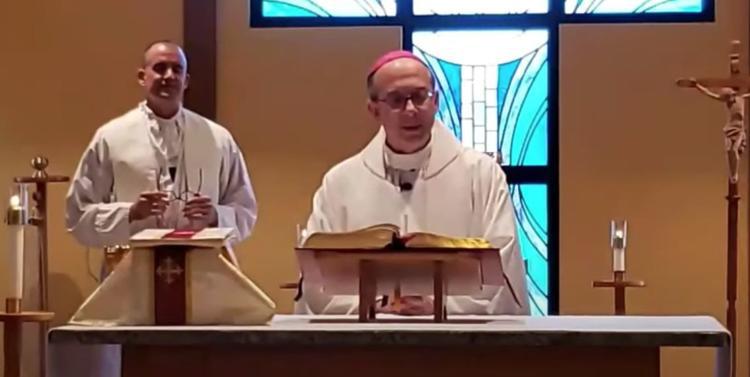|
Editorial: Father Mark White's inexplicable ouster
Martinsville Bulletin
The relationships within the hierarchy of the Roman Catholic Church are strict and complicated. They are founded in a structure and formality that eludes those who didn’t grow up under the church and its papal sovereignty, and their complexities can be daunting in trying to understand decisions, practices and reactions. But the one simple aspect of that structure that is without question is the church’s foundation in the principles of Jesus Christ, its purchase in the deep meaning and subtexts of Scripture. If is for the latter and not the former that the dispute between Father Mark White and his boss the Rev. Barry Knestout, the bishop of the Catholic Diocese of Richmond, appears not only perplexing but just so ridiculously unnecessary. You likely have read the many words published about the conflict that has led Bishop Knestout to remove Father White in all facets except title as the pastor of St. Joseph’s in Martinsville and St. Francis of Assisi in Rocky Mount. This began because Father White, disturbed by the way the church handled the sexual abuse charges against Cardinal McCarrick, the priest who ordained him, deigned to write in his blog about those feelings. Father White didn’t measure the tone in his comments, frankly and reasonably questioning the transparency and appropriateness of decision-making of the church all the way to the Vatican in Rome. He is not alone among Catholics in questioning this festering blemish on the church’s image. Bishop Knestout told Father White to discontinue his blog or else. Father White did. Then the pandemic hit, and Mass was canceled, and Father White resumed the blog as a means to communicate with his flock. He asked for permission to do so and said he received silence. But this dispute has not been carried out in silence. The two officiants have met, exchanged mail, published letters describing their positions in this newspaper, even shared Mass two weeks ago. Bishop Knestout told Father White he was reassigned. Father White cited due process within the church’s canons, said he wasn’t going anywhere and hired a lawyer. Now this week Father Mark White was told he no longer would be pastor in anything but title and to stay away from his parishioners. In fact, a law firm sent him a letter and told him to stay off church property. One problem: That’s where Father White lives. Oh, he has alternative housing. He can go to Abingdon and accept the new role Bishop Knestout has given him in the prison system. Yes, the bishop judged Father White and sent him off to prison. That may sound flip, but this is where we shake our heads in wonder that a man who openly is beloved by his parishioners is told he can’t tend them because he wrote something his boss didn’t like. That’s where we have difficulty separating church from state. Certainly we understand the tenets of leadership. And, yes, “the boss” has the right to hire whom he wants in the positions that report to him. In that sense, Bishop Knestout has the right. We also understand that in a decision-making structure there are times when we are confronted with asking for “permission” to do something or for “forgiveness” if we go ahead without formal approval. There has been a lot of asking and decision-making here, and it all feels a bit punitive and even perhaps vindictive. Forgiveness has not been an option that has been exampled in this. We recall the words of another pious man who told us when facing manipulations by his supervisor at work. He said something to the effect of: “My supervisor can’t really hurt me, because he’s not the boss of me. God is my boss.” At the heart of this dispute, you would think Father Mark White perhaps is saying that, too, because otherwise he has been exorcised.
|
.
Any original material on these pages is copyright © BishopAccountability.org 2004. Reproduce freely with attribution.
